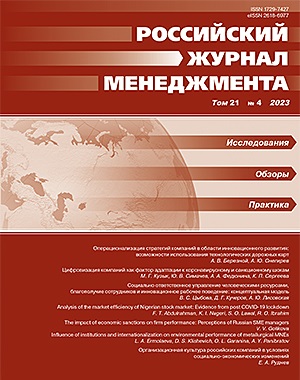Влияние институтов и интернационализации на экологические показатели многонациональных металлургических компаний
DOI:
https://doi.org/10.21638/spbu18.2023.406Аннотация
Цель исследования: в статье рассматривается взаимосвязь между институциональной средой, уровнем интернационализации многонациональных металлургических компаний и их экологическими показателями. Изучаются вопросы влияния уровня интернационализации и качества институтов на домашнем и зарубежном рынках на экологические показатели многонациональных металлургических компаний, а также возможности снижения институционального давления на домашнем рынке за счет международной экспансии.
Методология исследования: статья основана на количественном анализе с использованием панельной регрессии. Анализируются данные по крупнейшим многонациональным металлургическим компаниям из различных стран за период с 2017 по 2020 г. Выбор отрасли связан с ее значительным весом в структуре глобальных выбросов парниковых газов.
Результаты исследования: показано, что интернационализация и жесткая климатическая политика на домашнем рынке положительно влияют на экологические показатели многонациональных металлургических компаний. Кроме того, выявлено, что общие институциональные факторы в стране базирования, такие как защита миноритарных акционеров, также способствуют улучшению экологических показателей деятельности компаний. Тем не менее интернационализация негативно модерирует связь между жестким климатическим регулированием на домашнем рынке и экологическими показателями.
Оригинальность и вклад авторов: в работе сделан вывод о том, что, несмотря на общую тенденцию к улучшению экологических показателей, многонациональные металлургические компании с более высокой долей продаж на зарубежных рынках демонстрируют относительно худшие экологические показатели. Это отражает логику следования в так называемые углеродные гавани в контексте ужесточения климатического регулирования на домашнем рынке.
Ключевые слова:
МНК, экологические показатели, интернационализация, «углеродная гавань», металлургическая отрасль, ESG
Скачивания
Библиографические ссылки
References
Загрузки
Опубликован
Как цитировать
Выпуск
Раздел
Лицензия
Статьи журнала «Российский журнал менеджмента» находятся в открытом доступе и распространяются в соответствии с условиями Лицензионного Договора с Санкт-Петербургским государственным университетом, который бесплатно предоставляет авторам неограниченное распространение и самостоятельное архивирование.





